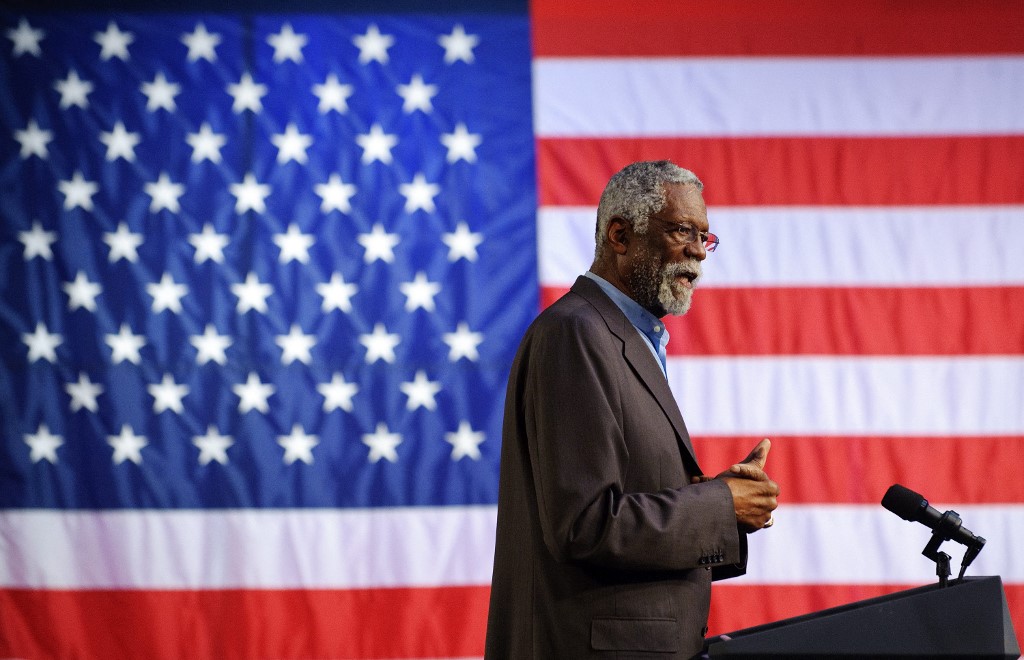
(FILES) In this file photo taken on May 18, 2011, former Boston Celtics basketball player Bill Russell speaks during a DNC fundraiser attended by US President Barack Obama at the Boston Center for the Arts. – NBA great Bill Russell, the cornerstone of a Boston Celtics dynasty that won 11 titles and a powerful voice for social justice, has died at the age of 88, a statement posted on social media said July 31, 2022. (Photo by Mandel NGAN / AFP)
Bill Russell, a dominating center who won a record 11 NBA crowns as cornerstone of a Boston Celtics dynasty, overcame racism to become the league’s first Black superstar and civil rights activist.
Russell, who died Sunday at age 88, was a five-time NBA Most Valuable Player and captain of the 1956 US gold medal team at the Melbourne Olympics who revolutionized defensive play in the NBA, taking rebounding and shot blocking to epic new levels.
He won eight consecutive NBA titles from 1959-1966. As a player-coach in his final three seasons, Russell was the first Black coach in North American sport and the first to win a title, doing so in 1968 and again in his 1969 farewell campaign.
Russell was the first Black player inducted into the Basketball Hall of Fame in 1975 and was awarded the Presidential Medal of Freedom in 2011 for his civil rights and basketball achievements.
William Felton Russell was born on February 12, 1934 in Monroe, Louisiana, but his family moved to Oakland, California, when he was eight.
His mother died when he was 12, never seeing Bill win two state prep titles and two national college crowns at the University of San Francisco after being ignored by many colleges because he was Black.
USF was the first major college team to start three Black players. The team coped with racist jeers at games and the refusal of hotels to accept Black guests — which prompted the entire squad to stay in vacant college rooms.
“I never permitted myself to be a victim,” Russell said.
Russell was snubbed for a regional top player honor after a 1955 US title run and turned his focus to team achievements over personal ones.
“That let me know that if I were to accept these as the final judges of my career, I would die a bitter old man,” Russell said.
Russell delayed his NBA debut to play in the 1956 Olympics, leading an overpowering American squad with 14.1 points a game, then sparking the Celtics with an NBA-best 19.6 rebounds a game plus 4.7 points a contest for Boston’s 1956-57 NBA champions.
In 1958, Russell won his first NBA Most Valuable Player award but he was slowed by a foot injury in the NBA Finals and the Celtics lost, only to begin their record run of eight consecutive crowns the following season.
Russell found himself and Black teammates often unable to be served or stay in hotels during exhibition games in some areas of the United States in the 1960s.
He would snub autograph seekers and refuse to acknowledge cheers for years after being hardened by such incidents.
Trail blazing coach
Celtics coach Red Auerbach retired in 1966 and Russell was named the coach while staying on the court, saying, “I wasn’t offered the job because I’m a Negro. I was offered it because Red figured I could do it.”
US civil rights leader Martin Luther King Jr. was assassinated on the eve of the 1968 Eastern Conference finals between Boston and Philadelphia, and there were calls to cancel the series with players on both clubs shocked.
But the games went on and the Celtics became the first team to rally from a 3-1 deficit to win a best-of-seven playoff series, advancing to the NBA Finals, where they defeated the Los Angeles Lakers for the title.
The Celtics beat LA again in the 1969 final and Russell retired, with the Celtics retiring his jersey number 6 in 1972.
For his career, Russell averaged 15.1 points and 22.5 rebounds a game over 13 seasons, with 11 titles in that span, including an NBA playoff record 24.9 rebounds a game.
Russell served two further brief stints as an NBA coach, guiding the Seattle SuperSonics from 1973-1977 with a 162-166 record and going 17-41 with Sacramento to start the 1987-88 campaign before he was released.